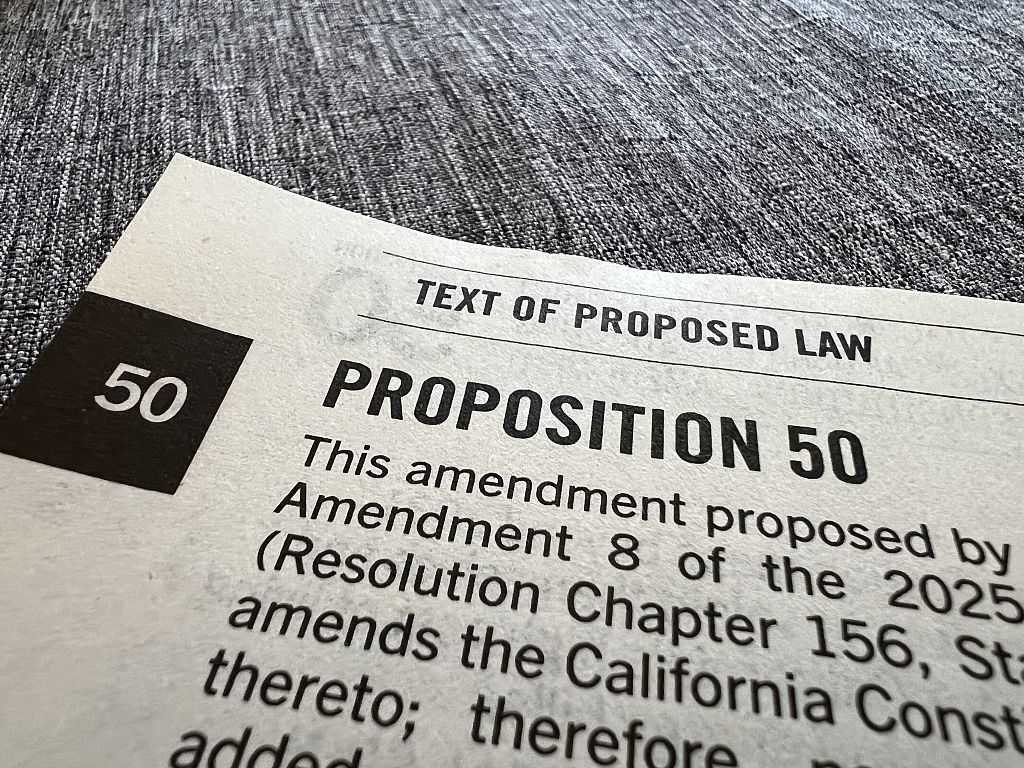Politics
California Voters Face Critical Choice on Proposition 50

California voters are preparing to make a significant decision regarding Proposition 50 in a special election scheduled for November 4. This measure seeks to allow state lawmakers to redraw congressional district lines for the upcoming elections in 2026, 2028, and 2030, which could influence control of the U.S. House of Representatives. The proposition also advocates for nonpartisan redistricting at a national level, although it does not mandate specific actions.
The push for Proposition 50 has gained momentum from California’s Democratic leaders, including Governor Gavin Newsom, who have framed it as a response to Donald Trump’s comments encouraging Texas to alter its district lines to benefit Republican candidates. In contrast to California’s established independent commission governing redistricting, Texas lawmakers have faced fewer hurdles in their redistricting efforts.
In 2008 and 2010, California voters approved the establishment of a citizen-led independent commission responsible for handling redistricting after each U.S. census. Any amendments to the state constitution, such as Proposition 50, must be approved by the electorate. The proposition, colloquially known as “The Election Rigging Response Act,” aims to create Democratic-drawn maps that would specifically target five districts currently held by Republican representatives in California, mirroring actions taken in Texas.
Arguments in support of Proposition 50 emphasize its potential to counter perceived partisan manipulation in electoral processes. According to a voter guide from the California Secretary of State’s Office, proponents assert that the measure would “counter Donald Trump’s scheme to rig next year’s congressional election” while reaffirming California’s commitment to independent redistricting practices. Notable supporters include former President Barack Obama, U.S. Senators Alex Padilla and Adam Schiff, as well as U.S. Representative Nancy Pelosi, among others.
Gavin Newsom has been vocal about the necessity of Proposition 50, suggesting that California must “fight fire with fire” to ensure fair representation. He has indicated that the state would proceed with its redistricting plans only if Texas continues with its own.
Opponents of Proposition 50 raise concerns about its implications for electoral integrity, suggesting that the measure was crafted by politicians primarily for their own benefit. The Secretary of State’s Office highlights that the proposition could dismantle safeguards designed to maintain fair elections and protect local communities. Prominent critics include former California Governor Arnold Schwarzenegger, former Fox News commentator Steve Hilton, and Riverside County Sheriff Chad Bianco. They argue that the proposal threatens to erode protections that prevent district maps from favoring specific political parties.
Furthermore, Kevin Kiley, a Republican representative from California, has expressed his opposition to mid-decade redistricting initiatives, regardless of party affiliation. He has advocated for federal legislation to invalidate such redistricting efforts across all states.
The financial implications of Proposition 50 are also significant. The special election is projected to cost approximately $282.6 million in taxpayer funds, according to the California Department of Finance. Additionally, counties may incur one-time costs estimated at “up to a few million dollars” to update election materials to reflect new congressional maps. These figures could rise following reports that 8 million voting households received inaccurate voter guides.
As California prepares for this pivotal moment in its political landscape, the outcome of Proposition 50 will undoubtedly have lasting effects on both state and national levels. Voters are urged to consider the implications of their choice carefully, as the stakes for fair representation and electoral integrity have never been higher.
-

 Science2 weeks ago
Science2 weeks agoIROS 2025 to Showcase Cutting-Edge Robotics Innovations in China
-

 Politics2 weeks ago
Politics2 weeks agoJudge Considers Dismissal of Chelsea Housing Case Citing AI Flaws
-

 World2 weeks ago
World2 weeks agoBravo Company Veterans Honored with Bronze Medals After 56 Years
-

 Lifestyle2 weeks ago
Lifestyle2 weeks agoStone Island’s Logo Worn by Extremists Sparks Brand Dilemma
-

 Health2 weeks ago
Health2 weeks agoStartup Liberate Bio Secures $31 Million for Next-Gen Therapies
-

 Top Stories2 weeks ago
Top Stories2 weeks agoIndonesia Suspends 27,000 Bank Accounts in Online Gambling Crackdown
-

 Sports2 weeks ago
Sports2 weeks agoMel Kiper Jr. Reveals Top 25 Prospects for 2026 NFL Draft
-

 Health2 weeks ago
Health2 weeks agoTop Hyaluronic Acid Serums for Radiant Skin in 2025
-

 World2 weeks ago
World2 weeks agoHoneywell Predicts Record Demand for Business Jets Over Next Decade
-

 Sports2 weeks ago
Sports2 weeks agoYamamoto’s Mastery Leads Dodgers to 5-1 Victory in NLCS Game 2
-

 Politics2 weeks ago
Politics2 weeks agoNew Jersey Voters Urged to Register Ahead of November Election
-

 Lifestyle2 weeks ago
Lifestyle2 weeks agoMary Morgan Jackson Crowned Little Miss National Peanut Festival 2025









